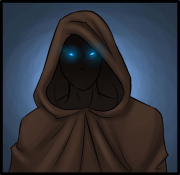|
Final Fantasy d6 Part 2 - Gameplay and Character Creation The chapter on how to actually play the game opens with a brief explanation of what, exactly, Final Fantasy is. On the one hand, it's actually brief. On the other, it also isn't actually helpful, assuming that whoever found this fangame somehow had no clue what Final Fantasy was. The problem is that it's written in a way that assumes the reader actually is familiar with the Final Fantasy franchise, with vague, in-joke-ish references to yellow avians, eight-foot swords, and androgynous villains. The worst thing about it, though, is that the author had actually written a perfectly good descrption of the Final Fantasy series just a few pages before, when talking about their design goals for FFd6. If you're a writer for a fan game of some media property and you've got to make a 'okay what is this thing I'm making a tabletop game about' section of your rulebook (and you really, really don't), tying it into your design goals is not the worst way you could do it. Next up is the system basics: the only dice the game uses are 2d6 per person and a 1d4 for percentiles (though, the game assures us, you can use a 2d6 for those too, with rolling a 5 or better being needed for something that's a 75% chance of success, 7+ for 50%, and 9+ for 25%. I'm not super great at math but that doesn't seem... exactly right to me). Every character has a Job, which is Final Fantasy speak for character class. You know, stuff like Black Mages and Dragoons. Jobs all have a pool of talents called Abilities that players can learn as their character advances. At level 1, a character will have their Job's Innate Ability, which you'll always have as long as you're a member of that class, and two other abilities of their choice, from either their Job or from the Shared (universal) Ability list. We then move on to crits and fumbles - two sixes on your 2d6 is a critical hit! In combat, that's an attack that never misses and might trigger a Limit Break; in skill checks, blessedly, it's not an instant win button. The game specifically says that rolling a crit on a skill check isn't an automatic success, which pleases me, the spiteful gremlin who hates all those AND THEN I ROLLED A 20 AND MY GM HAD TO LET ME SUPLEX A TRAIN LOLOLOLOL stories. In any case, double sixes are good! Of course, by the same token, the ol' snake eyes are bad. In battle, rolling two ones just means your attack misses, no mess no fuss no fumbles, but when dealing with skill checks, a roll of 2 on a 2d6 triggers a Complication, and congrats! Whatever thing you were trying to solve by rolling a skill check just got worse. Not only did you fail to pick the lock, but you triggered an alarm and the guards are coming! Not only did you fail to get the airship back under control, but now the engines are on fire! The game stresses that Final Fantasy characters are competent enough that they shouldn't just fail rolls, but what if you don't roll a Complication but also don't roll a success? Well, I, um On to character generation! Come up with a character concept ('neurotic Black Mage', 'narcissistic treasure hunter'), pick a name (the game suggests that you make it evocative and unusual), age (most Final Fantasy heroes are just coming into adulthood!) and race. Race is 100% just a descriptor in FFd6 (stats and ability-wise, there's no difference between a Bangaa and a Hyur and a Yeti) unless you choose to invest in being something sufficiently unusual by taking the Unusual Species Shared Ability. Unless you've done so, your character is also Vulnerable (takes 50% more damage) to Shadow damage, presumably because that's the damage type the baddies most often use. While I like that race is largely cosmetic, and thus the game is blessedly free of 'gotta be race x if you wanna be class y', I still wish there was some difference between the various races? When I run FFd6 I usually just let characters pick a non-crafting skill to represent their race/personal interests/training and give them a free +2 in it. I'm also not a huge fan of all characters being weak to a certain element by default. In any case, once you've picked your race, you then pick your Job, describe your character's appearance, give them a backstory substantial enough to give them some driving goals, and then give them a quote or catchphrase that's indicative of their personality. Surprise, surprise, Squall's "...whatever." is one of the examples. Why bother with the last one? Aside from giving you something to drive your fellow players absolutely nuts with later on, filling in a quote on your sheet gives you a point of Destiny, which is Final Fantasy d6's meta-currency. Time for attributes! There's four of 'em, and they're loosely linked to Final Fantasy's iconic four crystals: Power (PWR) is the stat of offense and the Fire Crystal. Both magic and weapons use this stat for damage by default, and special abilities that are purely offensive tend to use PWR as well. Resolve (RES) is the stat of defense and the Earth Crystal. It's not just physical toughness, but it's also willpower, vitality, and confidence. Mechanically, it's used to calculate your HP score. Mind (MND) is the support stat and is associated with the Water Crystal. Its main uses are in determining the potency of restorative magic and calculating MP, but certain weapons can also use it to determine their damage. Dexterity (DEX) is the utility stat, associated with the Wind Crystal. It's used to calculate: your chance of dodging attacks, damage with certain weapons, and your skill cap (along with MND). Dumping DEX is a fantastically bad idea, and it's incredibly easy to build a character that functions almost entirely with DEX. Starting characters have 25 points worth of stat to distribute between their four attributes. Those points are distributed on a 1:1 basis between the four attributes, with the caveat that you can't have a stat higher than 10 or lower than 1 at character creation, where 3 is the score for an average human. There's a note about how every attribute is important, which would be a good message were it not damnably false, which we'll explore in more depth when I make some sample characters for the thread. Derived stats! Finesse is equal to (MND+DEX)/4, and not only determines your chance at resisting certain abilities and mental/emotional status effects, but it also determines how many skill points you can invest in any given skill. Sure hope you invested in your Finesse skills unless you really like rolling 2d6+1 for everything! Force, on the other hand, is equal to (RES+PWR)/4, and, uh, helps you resist physical status effects, mostly. Hit Points (HP) are equal to (RES+your Job's bonus)*Level. For example, Black Mages have a Job bonus of 14, Monks have a Job bonus of 30. Yes, this means that Monks can dump their vitality score a lot more easily than the squishy wizard can. Similiarly, Magic Points (MP) are equal to (MND+your Job's bonus)*Level. If your Job doesn't have an MP bonus, you don't have an MP pool, simple as that. Black Mages have an MP bonus of 8, Monks have an MP bonus of 0. Avoidance (AVD) is calculated by adding a quarter of your DEX score to whatever your Job's base is - Dark Knights have a base AVD of 4, Ninjas have a base AVD of 7. The fact that it takes such a high investment for just a single point of dodge power means that, yes, once again, you'd be foolish to not start with a DEX of at least 8. Accuracy (ACC) is whatever your Job's flat bonus is (Entertainers have 0, Thieves have 2) plus half your level. I like that accuracy scales and that every character ends up pretty much equally competent at hitting things at high levels. Armor and Magic Armor (ARM and M.ARM) are just the total score from whatever you've got equipped plus any bonuses an ability might give you. Easy. After that, you pick your Abilities - I'll go over those on a job-by-job basis - and Skills (which are robust enough to deserve their own post), buy equipment, and you're done! Next Time: Skills and Destiny Leraika fucked around with this message at 01:29 on Oct 5, 2018 |
|
|
|

|
| # ? Apr 25, 2024 00:21 |
|
Also, since I'm going to be making characters for the thread, time to solicit character pitches! I'm going to want a Name a Job, and a Character Pitch. Go wild with the last one! The available jobs are: Black Mage, Blue Mage, Dark Knight, Dragoon, Engineer, Entertainer (bard + dancer), Fighter, Gambler, Geomancer, Monk, Ninja, Paladin, Ranger, Red Mage, Samurai, Thief, Time Mage, or White Mage. Note that Summoner is not an available option; Summoning is its own subsystem that any player can buy into. edit: deadline is whenever I get through skills/destiny/shared abilities, so 2-3 more posts? Leraika fucked around with this message at 03:29 on Oct 4, 2018 |
|
|
|
A Dragoon named Kayne Highwiind who is Constantly getting killed by raid damage because his magic defense is terrible and/or animation locks
|
|
|
|
|
Those 2d6 dice odds feel like they don’t account for two dice making a curve.
|
|
|
|
If you can't suplex a train why are you playing Final Fantasy.
|
|
|
|
Mors Rattus posted:Those 2d6 dice odds feel like they don’t account for two dice making a curve. Yeah, I went and checked, and apparently it's (rounded off) an 83% chance of rolling five or greater, 58% chance of rolling seven or greater, and a 28% percent chance of rolling a nine or greater. Night10194 posted:If you can't suplex a train why are you playing Final Fantasy. I guess that was a bad example. I will maintain unto my deathbed that 'I rolled a nat 20, that means I can do whatever I want' stories are bad and dumb, however.
|
|
|
|
He's a Dark Knight named DeMille who really should have stayed in bed this morning. She's a Black Mage named Lily who was never very good at that White Magick crap. They fight crime. (They're only here because I'm too lazy to think of knockoffs of the party from Final Fantasy XII.)
|
|
|
|
Snorb posted:He's a Dark Knight named DeMille who really should have stayed in bed this morning. On that note; He's an Engineer named Balthazar who think's he's leading man material, but due to how the mechanics work actually the worst with a gun in the party
|
|
|
|
Show me a Samurai named Jun Kurosawa, who's constantly getting shoved in the limelight, to his eternal chagrin.
|
|
|
|
|
Sir Derik The Paladin who Gets significantly weaker when he joins your party.
|
|
|
|
Barudak posted:On that note; He's an Engineer named Balthazar who think's he's leading man material, but due to how the mechanics work actually the worst with a gun in the party (On second thought, let's let everyone else have some fun, I already came up with the leading man and lady from not-Final Fantasy IV.)
|
|
|
|
Portia the Thief who is a extremely dickensonian street urchin because the translator decided it was so
|
|
|
|
Thondan the Entertainer who is a fast talking merchant committed to helping his friends have the best Winter Festival
|
|
|
|
I vote for Arch Eon, the Dark Knight who is held to be chosen by everyone, despite nobody ever choosing him.
|
|
|
|
Knowing how the system works, i'll give an example of how it ends up working with the right choices. I vote for The great, and powerful trixie a red mage who who has finesse for days, and will make sure you know she is better because of it
|
|
|
|
 COMBAT Or I Wrote This While Listening to the Furi Soundtrack Because It’s A Really Good Soundtrack. There’s Nothing Cute or Funny to Say, I Just Really Like Scattle and Carpenter Brut. Combat is…combat. It’s when fists meet face and you can’t just run away from or talk your way out of problems. It’s generally the logical conclusion to loving up stealth or intrigue where you flow from that failure state there into a right proper slobberknocker and then beat feet when you’ve got the opposition on the pavement. The general mechanics are the same as the baseline frame-setting and mechanical structure of structured scenes: Exposure stands in for health, pop the Signal to do it to it, second wind, etc. The main difference, as previously mentioned, is that instead of just a nebulous force/oppressive situation dealing out Exposure damage to everyone at a rate of 2 or 3 per round is that in combat there’s a pool of baddies who are either Conscripted Soldiers (dumb and meh) who deal 2 or Dedicated Combatants who deal 3 per enemy in the pool. So, if there’s 5 lazy Fist soldiers, each one deals 2 damage at a target they pick. You can add or subtract more depending on the narrative circumstances, but a 1:1 ratio baddie:player character is probably best so that way if you can spread the pain over everyone equally or mix and match. The stat rolls all work the same as previously mentioned. The only addition is that if someone gets a crit, the GM can either shut down the Signal if it’s up or can add more enemies to fight the players. If the PCs lose a combat encounter, thankfully it’s not the end of the world unless any of them were rebooted and at a risk of being permanently lost. Losing combat is just a hard twist in the tale that throws them into an evasion scene after escaping capture/while handcuffed or whatever or…strangely, negotiating their own release and surrender in intrigue. That one doesn’t make a ton of sense but whatever. So why do I feel like Combat needs its own section? Well that’s because the thing that sets this mode apart is specialized enemies/threats because the Fist has some tricks up their sleeves. Ordnance
THOUGHTS So yeah combat is designed to just kick your poo poo in, just put the boots to your back and make that rear end concave with well-placed swings. Fundamentally the end state is the easiest to understand of the three structured modes. In execution there isn’t actually any advice for how to build an encounter, just “add stuff as it sounds narratively good”. Sure, it makes sense for the basic enemy to fight to just be Freedom Fist soldiers but pretty much everything else exists to be a call and response of stuff to deal with if the players don’t have the proper powers to deal with vehicles. The other issue is that when you start mixing other baddies, even just chokepoints, you start getting ramping difficulty by making the enemies more chufty or deal way more damage. Even a simple grenade is a pretty big threat if you give four Fists a grenade each and throw them at four Receivers. Or at least that’s how I feel because I actually need to see this whole thing in motion at some point to see how well it actually stand up. NEXT TIME: Evasion scenes and Intrigue scenes and their nittiest gritties.
|
|
|
|
Let's really stretch the final fantasy system d6 system, and give us GODRIC Manderville, the World's strongest and least clothed Goldsmith.
|
|
|
|
unseenlibrarian posted:Let's really stretch the final fantasy system d6 system, and give us GODRIC Manderville, the World's strongest and least clothed Goldsmith. This
|
|
|
|
/mandervilledance
|
|
|
|
unseenlibrarian posted:Let's really stretch the final fantasy system d6 system, and give us GODRIC Manderville, the World's strongest and least clothed Goldsmith. I think stuff from the Hildibrand questline is absolutely the best way to stress test any Final Fantasy system, yes.
|
|
|
|
Cor, inspector!~
|
|
|
|
Final Fantasy d6 Part 3 - I Know It's My Destinygoddamn everyone posted:A whole bunch of character concepts Oh poo poo I didn't see this coming, and I'm starting to realize that I should have put out the call after I got through the Jobs and their abilities. Oh well, I'll do a couple of the more general concepts soonish, as a preview, and then save a few that require digging into the system a bit more for closer to the end of the writeup. Thank you all for your enthusiasm! I'm so glad you all are enjoying my look at Final Fantasy d6. Now, let's move onto skills. Characters have them! Starting characters have a number of skill points equal to whatever's listed in their Job stat block - for most Jobs, that'll be about 20 skill points, while the skill-focused Entertainer and Engineer have 24 and 26, respectively, and every character, regardless of Job, gets two skill points per level as they level up. Characters can have up to their Finesse score +1 points in a given skill, and I've probably harped on how extremely dumb this is plenty enough. (For the people in the back row: you can't say that all of your stats are equally valuable if only half of them contribute to how competent you are outside of battle.) Suggested house rule: Just let people use the higher of their Force OR Finesse to determine skill caps. Skills are a straight 2d6+skill roll, with a difficulty set by the GM. The default difficulties range from Elementary at 5 ('spot a dragon amongst a crowd of panicking people') to Impossible at 30 ('collapse a fifty-story building by putting your back into it' is the example given, though I guess you could put your train suplexing here, too). There's a note that social skills will never directly affect player characters, which I appreciate, and then an expanded look into Complications, which... Well, just let me quote this directly: quote:No situation is ever so bad it can’t possibly get worse. Well, okay then. Setting aside the obvious issues with this example, let's look at the fact that Complications, as written, generally force a roll for an entirely different skill, with the exact same difficulty as the previous roll. That means that Complications on high-difficulty rolls (which a character is already more likely to fail by sheer virtue of the fact that they're more difficult) are more likely to put the player in a position they can't recover from, simply because most characters won't be able to afford to get their skills up to the point where they can manage high-difficulty rolls on multiple skills. It also leads to situations where the follow-up skill check ends up much higher or lower than it would otherwise be. Off the top of my head and using listed examples of difficulty: Shifty Jack the rogue attempts to give himself the five-finger discount by stealing an apple in a crowded marketplace (Thievery, difficulty 7) and botches the roll, attracting the attention of the town guards. Normally, lying to the guard is a Moderate (Acting, difficulty 9) challenge, but Complications always take the difficulty of the roll that caused them, so lying to the guards after getting them suspicious is easier than it would be otherwise. Then there are two other examples of Complications that are less dumb (treasure hunter fails to pick lock on prison cell, has to convince guards that he's supposed to be there / car chase goes badly as multiple Complications happen in a row), and then we're on to the skill list itself! The game stresses that the list is not meant to be exhaustive and you can put down whatever you want as long as it makes sense for the character and the game and your GM's cool with it. Hooray! Too bad there's already too many skills as is, and about half of them could safely be combined with another skill. Let's go down the list! Athletics: Climb, tumble, jump, balance. This is the skill you'd roll whenever you're relying on your flexibility or coordination, like jumping out a window, sliding down a rope, or surfing down a building. It's probably also the skill that governs train suplexing, because there's no 'you are swole' counterpart to Athletics's 'you are flexible and coordinated'. Acting: Be a lying liar who lies, sharpen up your poker face, or just put on one hell of a performance. It's also the skill you roll when you disguise yourself, even if you're just trying to avoid notice. Awareness: It's perception. The game tells you to put points in it. Moving on. Escape: Your 'get out of a bind' skill. Takes care of things like slipping out of manacles, climbing out of the wreckage after you roll a Complication when you're piloting that airship, and, uh, jumping out of windows. It also covers escaping from battles, so I sure hope you can afford to put some points in it! Healing: Diagnose and treat illness and sickness. Why is this a dedicated skill in a system with no rules for injuries and commonplace healing magic and potions? Well, Inquiry: The research and information-gathering skill, which is distinct from Lore, which is your knowing stuff skill, and Negotiation, which is your talking to people skill. The only good thing about this skill is that you can max it out and be an Agent of Inquiry in honor of the greatest FFXIV character, I guess. Language: Read ominous inscriptions on artifacts! Talk to monsters! This skill is a binary pass/fail where if you flub the roll you don't know the language! It's super bad and should probably be rolled into Lore!!! Lore: The actual knowing stuff skill. It's a blanket for basically any specific lore you'd want to take, like Lore (Monsters) or Lore (History). Healing, Inquiry, and Language should probably all be different specialties of this skill. Mercantile: The art of the deal, sourcing equipment, and haggling, which is distinct from Negotiation because. It's also the art of identifying magic items, which is distinct from using Lore to know about them because. Honestly, just split this skill up. Nature: Foraging, survival, taming monsters, riding chocobos. I'm not convinced this needs to be its own skill, since a lot of it could be rolled into (say it with me) Lore, but at least it's more distinct than things like Mercantile. Negotiation: Talk good to people. Good to have points in. Apparently also covers lying ('A character with this skill can use their powers of persuasion to do anything from bartering for an item to convincing that troublesome Captain of the Guard that, no, they really aren’t an Imperial sympathizer, thank you all the same.'), so there goes half of the reason Acting exists! Perform: Whoooops there goes the other half. Also covers things like playing instruments and dancing at your SeeD graduation. Entertainers use this to power some of their abilities. Scavenge: Play Monster Hunter and get crafting components off your enemies. It's so restricted in use (only Bosses or Notorious Monsters can be Scavenged, and can only be attempted once per person per monster) that it's a waste of time most of the time, but crafting is so strong that you'll want to max it out anyway. GOOD SKILL 10/10. You could probably put the parts of Nature that aren't Athletics or Lore in here, honestly, and give it a reason to exist beyond giving you upgrade materials. A Complication on a Scavenge roll might summon rogue environmentalists. Stealth: It's stealth. Be sneaky. Do sleight of hand. Hide things. Legally distinct from Thievery and Escape, somehow. Swimming: tidus laugh.mp3 Synthesis: Crafting! Comes in all the flavors you'd expect, from Alchemy to Weapons. Synthesizing items reduces their cost by 50%, which is kind of hilarious in a system where a lot of your power comes from your sweet gear. You can also sell anything you've made for full price, in case you wanna be that guy who spends all his time making potions for 50 gil and harassing your GM into letting you sell them for 100 each. Synthesis is dumb. Systems: Do or know Tech Things. What if your game doesn't have Tech Things?  Thievery: Thief stuff. Filch things, open locks, forge documents, cheat at Triple Triad. Do you roll Escape or Thievery to pick the lock on your handcuffs?  Also overlaps, naturally, with Stealth. The Thief Job has abilities that rely upon Thievery. Also overlaps, naturally, with Stealth. The Thief Job has abilities that rely upon Thievery.Vehicles: Your drive/pilot skill. Why are this and Systems two different skills? So, to recap: Acting could stand to be split into Perform and Negotiation, Stealth/Thievery/Escape all operate under a shared banner depending on use, Mercantile and Inquiry are just offshoots of Negotiation (and/or Lore), and there are a whole goddamn lot of skills for just Knowing Things even outside of the blanket Knowing Things skill. This system is kind of a mess. In any case, astute readers will have noticed that the skill check difficulties in Final Fantasy d6 have a theoretical maximum of 30, which is kind of hard to reach on a 2d6+skill roll. So, how are you supposed to meet those tasty train-suplexing DCs? Let's talk about Destiny. Destiny, like I mentioned before, is Final Fantasy d6's meta-currency. You start the game with one point of Destiny for filling in a quote on your sheet, and you earn more by doing things like defeating bosses, achieving your in-character goals, and doing suitably Cool Things, like, say, holding up a burning building while the rest of your party goes in to save the people trapped inside (which awards Destiny to the everyone). This is a good system! I like games that reward the players for stunting. What do you use Destiny for? Good question. The most basic use is to Enhance a roll. Each point of Destiny spent is +1d6 to the roll, any roll, there's no limit, and you can add more dice to your roll after you see the result until you get what you want. You can spend three points of Destiny to Change your Job. You keep your old abilities, spellcasting ability (if you had any) and weapon proficiencies, but all class-derived statistics (HP, MP, and so forth) as well as your Innate Ability swap to that of the new class. Automatically activating Limit Breaks, the powerful custom attacks that every character learns, costs the same three Destiny (as well as requiring you to be under 25% health), and if you're wondering why a powerful permanent affect and a powerful effect that lasts for a single turn cost the same amount of Destiny, you may just be starting to realize there are some problems with this system already! Blaze of Glory and Cheat Death have similar effects: when your character is about to die, you can spend the appropriate amount of Destiny (5 for a Blaze of Glory, all the destiny you have, minimum 7, to Cheat Death) to declare that, in the former case, their death had some massive dramatic impact on the world; they sacrificed themselves to save an NPC's life, they held off the Empire long enough for everyone to get away, they were a playable but not main character in Final Fantasy IV, and so forth. Cheating Death is your standard 'I fell off a cliff/into a vat of aetheric energy/I clearly died but they never found the body' type deal. You're encouraged to just slip the GM a note saying that you're Cheating Death instead of announcing it, which seems like a gigantic waste of time to me, in the 'unless your fellow players are all asleep at the wheel, they'll probably be able to figure out that you're Cheating Death long before the GM sets up your triumphant return' sense. Both of these are also bad in that there are only two non-cinematic ways that a character can die: either the entire party is KOed in a fight against a Boss (in which case, enjoy your TPK) or a single player is KOed against a Boss or Notorious Monster that is capable of using one of their actions to kill a KOed character, which would be kind of a dick move for a GM to pull, I think. The other two main uses of Destiny don't have a fixed cost: there are certain Abilities that require the expenditure of Destiny points to perform, and Summoning has a variable cost depending on how strong your summon is and how many characters are contributing Destiny. As a meta-currency, Destiny just does too many things, and none of them are really balanced against each other in a way that feels satisfying. Why would you spend your destiny just to improve your rolls when you could be saving for a Job change or to use one of the abilities your Job gives you? Why does it cost the same amount of Destiny to use a Limit Break, which is generally just Bigger Numbers or More Buffs on an attack, as it does to multiclass? Why would you use the same currency for all of those things? There's not a really easy solution, but one I've seen done before is just to give players a pool of Destiny that refreshes every session they can use for the cool things like Limit Breaks and enhanced skill rolls but not for the practical things like Job abilities or changing Jobs. Next time: Shared Abilities, or, "Hey like half of these things should be fluff, goddamn." Leraika fucked around with this message at 19:35 on Oct 4, 2018 |
|
|
|
DigitalRaven posted:Now I want to run a game where draculas are not necessarily trying to defeat the Skeleton Clown God, just to remove the curse around Sigmarite symbols. Because then they could show the appropriate dedication, piety, and so on, and get Sylvania officially recognised as separate from Stirland and the Count of Sylvania (Mannfred would need... removed, of course) promoted to an official Elector Count, gaining greater political legitimacy. And, because vampires, a good crack at being Emperor in a couple of hundred years. Now I'm picturing a Sigmarite Vampire who turns his curse into proof of his devotion. "I pray to Sigmar twice every day--the altar sets me on fire, but by Sigmar, I uphold my religious obligations." And a bunch of flagellants are like, "This guy gets it."
|
|
|
|
Precambrian posted:Now I'm picturing a Sigmarite Vampire who turns his curse into proof of his devotion. "I pray to Sigmar twice every day--the altar sets me on fire, but by Sigmar, I uphold my religious obligations." And a bunch of flagellants are like, "This guy gets it." Flagellants are still the weirdest part of Sigmarism to me. I know they're mostly in because of the classic doomsaying flagellants of the black death period, and I suppose the justification is supposed to be 'The God of Law and Order has to punish someone, so if we offer ourselves for punishment it will protect the rest of the community' (which is not without precedent, at least, the idea that a religious professional or specialist can redeem the sins of others and spread salvation to the rest the community), but it's mostly the way they're almost all Sigmarites that makes them weird. I suppose they're also a function of the way Sigmarites believe the main way to resist Chaos is stringent self-denial. The Friar career from the main book was specifically founded by an ex-Witch Hunter who spent his life fighting Slaanesh, and founded a religious movement of mendicant traveling friars who spend their life on a vow of poverty because he believed it was the only way to stop everyone in the world from eventually doing something Slaaneshi. Said Friars now have a reputation for wandering around getting drunk and getting up to party antics. Good job, Witch Hunter. Good job. Night10194 fucked around with this message at 21:53 on Oct 4, 2018 |
|
|
|
I think the main reason Flagellants are primarily Sigmarite is that no other faith really practices the right brand of denial of the flesh. The Sigmarites developed into gigantic prudes who hate the human body in a way almost no other cult has. Morr might have a few, I guess?
|
|
|
|
On that note, it's interesting that they removed the 'promote the unity of the Empire at the cost of personal liberty' stricture from Sigmar in 4e, and added 'you can defend yourself' to Shallyans. I imagine the latter was to make Shallyan PCs easier (especially as their traditional weapon, the quarterstaff, is a lot better in 4e than 2e) and that the former was to make the Sigmarites a bit less of dicks to make them easier to have around, too.
|
|
|
|
Night10194 posted:
Low level banal hooliganism might be a decent way of keeping people from advancing to "jam needles in eyeballs in order to feel something again."
|
|
|
|
They did make Rhya the Party Goddess, so at least it's only the creepy stuff that's Slaaneshi now.
|
|
|
|
wiegieman posted:They did make Rhya the Party Goddess, so at least it's only the creepy stuff that's Slaaneshi now. They could do for Slaanesh in WFRP what they did in Black Crusade and make Slaanesh more about flamboyance and excess than anything else.
|
|
|
|
Dawgstar posted:They could do for Slaanesh in WFRP what they did in Black Crusade and make Slaanesh more about flamboyance and excess than anything else. Black Crusade's Slaanesh book is why I'll never rag on FFG too hard, despite all their mechanics being shoddy and every single game having at least one Half Baked Highly Complex Important Subsystem because that was apparently their mechanical trademark for the line. Way more fun to have a book about insane theatricality and insulting someone so hard their heart explodes rather than wall to wall creepy poo poo.
|
|
|
|
Dawgstar posted:They could do for Slaanesh in WFRP what they did in Black Crusade and make Slaanesh more about flamboyance and excess than anything else. yea I liked BC's take of 'Slaanesh is more about excess and selfishness than anything else, they revel in gorging yourself on food or art that you love while others get nothing and dressing fancy for no reason other than your own pleasure just as much as their weird blood orgies'
|
|
|
|
Slaanesh as self-destructive obsession is definitely better than Slaanesh as Lobster BDSM.
|
|
|
Leraika posted:Also, since I'm going to be making characters for the thread, time to solicit character pitches! e: He's a moogle obviously
|
|
|
|
|
FFRRPG Part 11: Equipment So equipment comes in two flavors (Equipment) the permanent stuff, and consumables(the uhhhh one shot stuff), there is also crafting materials which thankfully just have a level. Each of these have a rank from 1-8 then Artifact(9) and Legendary(10), with the last 2 being GM only, and legendary being unique. Now unlike what sanity would dictate, prices aren't determined by just checking rank to equipment/consumable/material, each has their own price. Also items have an availability value, rather than the GM allowing you to buy on level stuff you have to hope on level items are for sale....or have the GM hand out treasure. My suggestion for your fighter? Save your cash until you can buy a level 8 weapon, roflstomp the game until 40. Weapons use Str, Agi or Mag(Well Staves use Mag, Rods use Str, one more reason to go white/time mage), with each weapon category having a die type(yes there is random damage after all that math and flat DR), and weapons of a die type all share the same progression with Str weapons having the best. So far so good, besides you know random damage. So let's talk about some big problems with equipment design. First off, as we talked about most characters use weapons as stat sticks, while fighters care about their weapon's base damage they don't care if it does fire damage or a 30% chance to inflict death, most weapons even mage weapons are invested in these as the thing. This is especially notable on artifact/legendary weapons, as those can make or break your endgame. For instance say you use swords. The Ultima weapon adds 1/5th your current hp to your attack actions, the Caladbolg gives auto-power-up and auto-magic-up, A boost to auto-attacks or 25% boost to damage, one of these is a clear edge for your ultimate final sword. Armor you'd think is a little better right? Well assuming your armor is up to date, on par armor will reduce auto attack damage by 1/4th to 1/3rd, getting worse and worse for stronger attacks. Armor also has more variety of special abilities. So for armor you can basically ignore the base stats entirely just for stats, and you don't have any silly attack boosts. Oh armor is also divided into. Armor Armwear Headwear Possibly a shield And an accessory slot. Consumables includes a long list of standard healing items(which if you have a Whitemage and not a chemist ALWAYS BUY MP HEALING ITEMS they are much cheaper per hp), and battle items(which do mag based damage and you will never use.). Yeah, this game is......not well designed. WhitemageofDOOM fucked around with this message at 09:04 on Oct 5, 2018 |
|
|
|
Well, this is a long time coming. Sorry, everybody! Vampire: The Masquerade (2nd Edition) Preface Chapter 1: Introduction Chapter 2: Setting Interlude: A History of Face Grabbing quote:To reign is worth ambition though in Hell: Chapter Three: Storytelling Vampire does something I don’t think I’ve seen in any other game: it has two chapters on the art of gamemastering. The first, “Storytelling,” gives advice on GMing in the moment, while a later chapter advises you on assembling a campaign. If you follow this thread, you’re likely aware that Vampire came to be associated with a particular style of GMing. You could call it auteur theory for roleplaying; the gist is that the GM is the author of the Story. The players’ job is to figure out where they’re supposed to go and what they’re supposed to do to allow the story to progress. A rough synopsis for the campaign has already been written. Critics of Vampire and the games it inspired say that they confine the players to being passive participants in storytelling, perhaps wallowing in melodrama for lack of any real agency. I have experience with several games from the 90s-00s that were designed from this point of view. They tend to portray the GM’s job as an enormous design project, and the players as dirty, sticky-fingered children prone to wrecking everything they touch. The worst product of these games are “narrative mechanics” that really serve as a cudgel to keep the PCs in line. (If you’re curious, read my review of Everlasting: a Vampire Heartbreaker full of “legendmaking” mechanics that mainly serve to punish players whose style doesn’t meet your standards.) Why were there so many of these games? My analysis is that it was simply the state of the art. The hobby was still breaking away from from the adversarial, punitive style of GMing that enshrined itself in the 80s. The focus of discipline just shifted away from rules mastery and tactical decisionmaking, and onto roleplaying “the right way.” But back to Vampire itself. Is it fair to lump it in with the games it inspired? That’s one of the questions that led me to revisit it. Whatever the case may be in later White Wolf publications, the advice given in this chapter is solid. It advocates a healthy balance between preparation and improvisation, uses specific examples to discuss common problems, and puts priority on keeping yourself and the players entertained.  Gonna jump this sweet baby over a pope The Role of the Storyteller It does, unfortunately, kick off by emphasizing the godlike power and responsibility of being the Storyteller. The Storyteller’s role is likened to that of a director, stage manager, and other behind-the-scenes roles in a stage production combined, and a poet, inventor, even a god. After all, it’s your job to create a detailed world out of thin air, be the final authority on the rules, play all the NPCs convincingly, and most importantly, improvise responses to the PCs, who have complete freedom of action. With that out of the way, the first specific advice it gives is that you should “never simply tell a story” and force the game down a predetermined path. Prepare, but don’t over-prepare: anticipate the likely paths the PCs may take, but have a few contingency plans. Prepare story hooks, not a detailed plot. The advice on rules is mostly about when to set them aside. On the spectrum from “rules lawyer” to “freeform,” Vampire leans toward the latter. But whether you use every optional rule in every subsystem, or only make simple rolls on occasion, the PCs’ should always feel like their decisions matter. It raises an example: Let’s say the PCs have spent weeks tracking down a centuries-old tome with vital information about the Sabbat. A botched roll results in the PC holding the book falling into a huge fire. How to handle it? One way is simple to negate the roll. That works, but may teach the players both that the plot is set in stone and that they can never really fail. A better way is to amend the story--the book and the PC are toast, but another way forward soon presents itself. Yet another way is to allow the player a last-ditch effort to throw the book to safety. The best way to handle it is a matter of opinion, but ideally you want to run a game where failure is real, but the campaign isn’t going to end abruptly because of a few rolls of the dice. The next section is about managing the players and the advice here is...mature and reasonable. (Today, that’s a low bar to clear, but in 1992 it was still common for games to encourage Machiavellianism, vindictiveness, and outright cruelty on the part of the GM.) If a player becomes too domineering, talk to them privately and point out the problem. If other players aren’t speaking up, solicit their input. And if a problematic player refuses to change, don’t invite them back. This section also says that the GM is first and foremost an entertainer, encourages you to cater to the players’ tastes, and lists off some reasons that people enjoy roleplaying games: storytelling, problem solving, accomplishment, emotional catharsis, power fantasy, the chance to be someone different, and just hanging out with friends. Storytelling The next section goes into detail about effective storytelling in horror, and how that applies to roleplaying games, dealing with several interrelated concepts one by one. I’ll discuss them in terms of how they relate to one another, not the order in which they’re presented. The first and foremost is suspense. Anticipation and mounting dread are more important than shock or gore to the kind of horror Vampire wants to create, which is “suspense in the Hitchcock tradition,” not “splatterpunk or slasher horror.” Simply adjusting to their new existence as a vampire is a source of fear and mystery. You want the players to feel anxiety, and vampiric existence is constant anxiety because there are so many dangers and risks beyond the limits of what you can perceive, much less predict or control. Another vital element is timing, which is “so personal and subtle that it is impossible to teach.” That’s just wrong, but anyway, timing has two functions. First, you want to begin with mystery and anticipation before spiraling into horror and chaos. Second, you need to control the pacing of scenes so that fast-paced events, like combat, actually feel frenetic and desperate. Two more closely related concepts are change of pace and the deadline. The first is simple--like most horror films, you can’t just build tension to a fever pitch and then keep it there for the rest of the story, so build in calmer scenes that ultimately serve as “the eye of the hurricane.” At the same time, horror stories are often built around some looming threat that will reach critical mass if the protagonist doesn’t actively fight it. If the players get so comfortable that they think the plot is something just sitting there while they decide how to approach it, ambush them. You don’t have to force them down a railroad, but you do have to deny them the luxury of planning out their every move. Two elements that stand in contrast are description and what Vampire labels imagination--by which it means “don’t tell them what to imagine.” Setting the scene in lavish detail, right down to the odor of blood, establishes a Gothic horror atmosphere. However, any horror fan will tell you that a great deal of it is about what isn’t there. Give them clues that point them in a certain direction, but leave out the details and let them drive themselves crazy. An element that stands alone is “delayed success.” Vampire has extended roll mechanics, and encourages you to use these for set-pieces where the PCs are in a race against time. Next are secrecy and intrigue. Horror roleplaying isn’t just about constantly menacing the players, it’s also about creating a setting full of mysteries that demand to be investigated. This is easy in Vampire because Kindred live on intrigue as much as blood. They’re selfish, never totally honest about their agenda, and (knowingly or not) always doing the bidding of a Kindred higher up the pyramid--all the way up to the Antediluvians themselves. With that in mind, a related element is scope--start small and build to an epic conflict, or start big and slowly focus more and more on character drama. (I understand what they’re trying to see, but this comes across as vague and strange. It even uses the Death Star as an example of a threat that at first seems overwhelming, which is a downright bizarre choice of example. I can think of better examples from contemporary films that would be more relevant to a game about vampires.) The last, and most dubious concepts I’ll discuss are the safe haven and dependents. Don’t let the players have a “home base” where they can always assume they’re safe. Better yet, do, and build their trust in it over time so that you can pull the rug out from under them. By the same token, encourage the PCs to build relationships with mortals...then kill them off, or turn them into villains. Though the book does caution you to be careful with turning allies into villains, any experienced GM can tell you that menacing the PCs’ homes and loved ones has to be done gracefully if you don’t want the players to think that you’re punishing them for investing themselves in the story. A small but intriguing idea I’d like to point out is the idea of storytelling as a cure for the alienation of modern society. In the list of reasons people roleplay, Vampire says that people enjoy power fantasy because “many people feel powerless in today’s impersonal, hypertechnological society.” On the same page, it says that the unique appeal of roleplaying as a medium is in the free will it affords, “unlike the real world where it is all too easy to feel like a very small cog in a very large machine.” This sentiment doesn’t recur often enough for me to think that a lengthy critique would be fruitful, but I think it’s interesting in light of the fact that the World of Darkness was often accused of being anti-technology and anti-modern. Advanced Storytelling What the book calls “advanced storytelling” techniques are more like a series of specific gimmicks. The first is flashbacks, in case you’re really jazzed about Highlander. But seriously, they encourage you to use flashbacks to explore some event in a PC’s past, with other players taking the roles of people close to them. It suggests using flashbacks to show that a PC’s sire was observing them for some time before their Embrace, perhaps since they were born. That’s creepy as poo poo, and I have to admit it has storytelling potential, but I don’t think I’ve ever known a Vampire group that tried it. A similar idea is the parallel story, where the group takes on new roles as other characters involved in the events of the campaign. One idea I like is playing out a slasher-movie premise wherein the PCs are vacationers who run into, say, a pack of Sabbat vampires. I doubt any of my players would go for it, but I do like the idea of taking a break to play some poor dumb bastards who suddenly realize they’re living in a bleak horror setting. Some ideas that don’t impress me at all are foreshadowing, dream sequences, and symbolism. Vampire suggests you play out scenes where some characters are receiving premonitions of some future threat, or exploring a character’s psyche, perhaps with Auspex (a Kindred power of psychic awareness) as a rationalization. They even suggest having players search for a nonexistent “Talisman” that encourages them to think about their characters’ real goals. In my experience, professional RPG writers are inconsistent when it comes to writing scenes involving dream-logic and symbols without being clumsy and obvious, and your average GM is much worse. Last, and most importantly, a couple of pages are devoted to Live Action Role Playing. I don’t know if any game before Vampire included advice for LARPing in its corebook. As far as rules are concerned, LARPing requires the GM to make snap judgments about whether attempts should succeed or fail based on the PCs’ Traits--the famous rock-scissors-paper rules from Laws of the Night haven’t been developed yet. The other rules are the common-sense ones that everybody knows and everybody breaks. No real weapons or realistic replicas should be used. Never play in a place where the other people present don’t know what’s going on.* Always respect the Storyteller’s authority to call a time-out. It also has plenty of suggestions for appropriately atmospheric decorations. Candles, Black fabric hangings, “creepy” music, more loving candles, top hats, capes, and canes. Try to find a cane and a top hat with candles on top. Preferably black. *I once threatened to kill someone, loudly, in a hotel room. gently caress you, I roll Brujah. Do’s and Don’ts The chapter ends with a straightforward set of bullet points for the aspiring Vampire Storyteller. Most of this has been woven into what we’ve already discussed. Do keep all the players involved. Always give everyone something to do. Even if you pay more attention to the more active players, don’t ignore anybody. Do go beyond the rules. “The rules are for keeping the players in line.” Hm. Anyway, you don’t have to carefully roll dice for everything NPCs are doing--especially if you’re dealing with elder vampires, werewolves, sorcerers, and other things we haven’t written sourcebooks for yet. Do let the PCs interact with each other. If they only roleplay in interaction with NPCs and not each other, something’s wrong. Do take breaks. Players get time to think when you’re dealing with other players, but you don’t, unless you decide to take one. (It even encourages you to pretend you’re consulting the book in order to get a break, which seems strange.) Do let the players have input. If you don’t keep a PC’s goals in mind, the player can’t stay in character. Don’t punish the players. While bad choices and bad rolls should have negative consequences, don’t punish players for coming up with ideas that aren’t exactly what you anticipated. Don’t railroad. Vampire is a game of selfish bastards with desires and goals. Leading the group around by the nose through some plot you’ve already decided defeats the purpose. Don’t let the dice decide everything. The primary driver of the plot should be the characters’ choices. The dice are there to add some unpredictably. Don’t forget the characters’ Traits. Vampire characters have critical weaknesses and superhuman powers. For example, if your story rests on a single missing clue, a character with certain powers can instantly find it. You might also find yourself guilty of springing an ambush on the PCs that their powers or their allies should reasonably have warned them about. Don’t rely on stereotypes. Stock characters are useful, but you should always challenge them and add nuance. A dangerous villain, for example, might be acting out of fear and desperation. I came away from my reread of Vampire surprised at how much it emphasizes the freedom, creative input, and self-motivation of the players, as opposed to the “auteur director” reputation it attained, deservedly or not, later in the life of the product line. This update of Vampire: the Masquerade was brought to you by absinthe. Absinthe! When the world is a gently caress but you're too refined to be a craggy Bukowski type...what was I saying?  Next time on Kindred the Embraced: The basic mechanics of this game. Hope you like Shadowrun!
|
|
|
|
Mors Rattus posted:Slaanesh as self-destructive obsession is definitely better than Slaanesh as Lobster BDSM. yea all the other chaos lords have a heavy self destruction element but Slaanesh rarely gets one unless you count dying of blood loss when your nonbinary lobster demon fuckbuddy snips your donger off.
|
|
|
|
 EVASION AND INTRIGUE Or This Time It Was The Payday 2 Soundtrack to Get Me Through This Slog Evasion Evasion is the easiest structured scene to deal with. Exposure is automatically increased at the start of each round depending on the level of alarm (Guarded for 2, High Alert for 3) and environments/threats don’t necessarily have to be combat oriented. Evasion can take the form of a nighttime drive through checkpoints or keeping your head down in a crowd or sauntering into an office building like you belong there. Completing evasion is also pretty easy: accumulate 10 Waypoints which are more or less just successes. This can go up to needing to get 20 and waypoints can be split across multiple areas you need to progress though. However, once you get your own cache of waypoints together, you’re out of the scene and in the clear and can no longer influence anything. The teamwork element here is the fact that it’s better to try and keep pace with the others so you can help them out if they flag instead of just sprinting to the finish line. Because if you do sprint to the finish line, anyone left behind who hits 10 Exposure and can’t flush it at the end of a round automatically triggers a failstate of evasion that rolls into combat or needing to talk your way out of nonsense. You have to go back and get them or get them released. And this is just a single player failing means the Regime is on to you and the entire op is tits up in the bay. Also critical failures tend to turn off the Signal if it’s popped or raises the heat level of the alarm. Tips for evasion narratives: focus on building and releasing tension, treat the narrative like a camera and play with the perception of the scenes, indulge the senses, show the courage of the actions of the evading players doing dangerous things, show chases or alternately flip the script so that a foe is the one evading and needs to be caught in X successes. But that’s really what evasion is and how it differs from combat. Everything else is the same except for enemies. As for intrigue! Intrigue Intrigue varies depending on the mood and the events. It could be talking an armed gunman down from escalating things into a firefight, it could be trying to find a mole, it could even just be a classic library montage of trying to collect data. You’re trying to fulfill an Agenda and need to accumulate Talking Points (Waypoints/successes) to do so. Your main enemy is here Pressure which is how hostile the environment is to you (Tense inflicts 2 Exposure to everyone per round, Hostile inflicts 3). Intrigue isn’t all talking. It can be interrupted with moments of focused violence or powers or stealth to maneuver into a more advantageous position. And Agendas themselves are pretty simple: you’re either gathering intelligence, changing someone’s mind or talking your way into getting access to things you shouldn’t see. The main upside of Intrigue is that you’re all working together to a total pool of Talking Points. At a minimum you’re trying to get 20 as a group with 40 being a harder side of things or the sky theoretically being the limit. On average you want 30-50 successes which…isn’t too bad because hey, cooperative effort. Plus there’s no rest of the entire thing being a goatfuck if one person slips up and gets 10 Exposure at the end of the whole thing. At worst you go from on the rails to off the rails and the GM introduces a complication or emergency that is directly responding to your gaffe that you now have to work around. This could mean switching to evasion or combat but it could also be that you stumbled and put a hole in your cover or that the receptionist told her boss something you said and he wants a word with you. Even a critical failure just raises the mood of the moment or turns off the Signal if it’s up. The downside is that the Talking Points needed could be pretty ludicrous and they’re all broken up into different checkpoints of what you’d need to accomplish to pull the entire thing off. But, all things considered, baseline Intrigue is probably the easiest one to tackle as a group. It’s not unreasonable and it lets you really just have the heavy-hitters dig deep for dirt while the supportive characters gloss over faux-pas and drain Exposure. Narrative advice amounts to letting the players immerse themselves in the details of the scene, work with the GM and other players to show what your actions are doing based on your successes or failures, “show fascism but don’t be fascist” by showing a comfortable level of societal bigotry and the consequences of it and finally to let the Gift of the Stranger allow the players to chat amongst themselves freely or cover up their subroutines/powers as being more banal and benign than they are (super strength translating to a firm and memorable handshake, stuff is just a freak accident completely unrelated and not worth calling the Fist over). Anyway because we can’t have nice things here’s an optional rule: the Voice of the Outgroup. The VOTO is meant to simulate walking into a situation where you don’t have the advantage or the privilege found in the dominant culture. A woman in a room full of rich white male stockholders, a black man in an Alabama café, an out gay man in a hard-right fundamentalist church where Leviticus is embraced. VOTO is, specifically, not being a part of that inner circle and trying to get their attention and change their mind despite one’s status as an outsider. What this means mechanically is that the successes accumulated by 10s are doubled so one 10 counts as two successes…at the cost of 0 successes being counted as a critical failure instead of just a weak failure. You’re intentionally making yourself a target by standing up and swinging a bat at the hornet’s nest. This is an interesting rule…but is wisely optional due to the implications of trying to emulate actual real-world social affairs mixed with this unedited writing. This book's writing and voice and messages posted:The Voice of the Outgroup can be a movement’s most powerful political weapon. When someone defies social expectations (typically the expectations of silence and obedience), it can be a showstopping call to action. However, its use comes at enormous risk to those who use it. When a member of an outgroup speaks, the ingroup will generally only hear her words if she is able to maintain absolute composure and incorporate some of the norms and expectations of the ingroup. Any release of emotion, moment of inconsistency, or factually debatable statement will inflame the ingroup, causing them to question her motives, attack her character, insult her intelligence, and cite anecdotes (however rare) to invalidate her argument. So yeah that’s intrigue and why VOTO isn’t…a great rule, even as an optional rule. THOUGHTS So yeah combat really gets all of the crunch and cruft because like at some point it’s going to come to blows and the simulationist inside of all of us cannot be denied the blood they hunger for. But in all seriousness, this is what the normal modes, like, look like. If you were to sit down with a copy of these mechanics and get jazzed to make a new form of structured scenes (hacking! ritual magic! crafting! drug synthesis! building power armor!) this is what the actual diceplay of the game looks like. You either try to get a big ol’ pile of bennies in a specific scenario or just try to get them all for yourself. And it’s…okay? It’s passable, it’s solid enough, and while it looks pretty unreasonable now to get like 30 successes to find where the Declaration of Independence is being held, we’ll see that tune change pretty quick when we take a look at character generation and what exactly powers are. Speaking of, NEXT TIME we’ll take a look at building a character! I will not be taking requests because I have a very special character in mind for October and also for this woke-rear end age of shenanigans.
|
|
|
|
Precambrian posted:Now I'm picturing a Sigmarite Vampire who turns his curse into proof of his devotion. "I pray to Sigmar twice every day--the altar sets me on fire, but by Sigmar, I uphold my religious obligations." And a bunch of flagellants are like, "This guy gets it." *Catholic nod of approval*
|
|
|
|
Precambrian posted:And a bunch of flagellants are like, "This guy gets it." And gets jealous that Sigmar doesn't set him on fire. Notice me sempai!
|
|
|
|

|
| # ? Apr 25, 2024 00:21 |
|
sexpig by night posted:yea all the other chaos lords have a heavy self destruction element but Slaanesh rarely gets one unless you count dying of blood loss when your nonbinary lobster demon fuckbuddy snips your donger off. There's the Slaaneshi hero who has Stupidity because he might get distracted admiring his reflection in your shield.
|
|
|




































